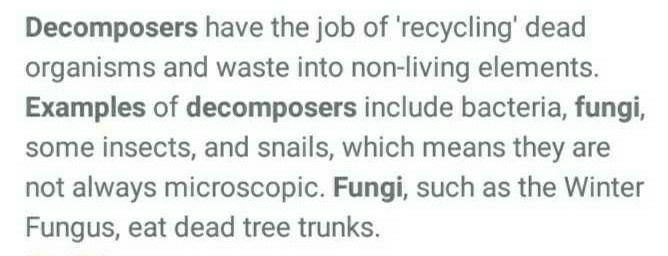Class 6 Exam > Class 6 Questions > Explain Decomposers with an example.?
Start Learning for Free
Explain Decomposers with an example.?
Most Upvoted Answer
Explain Decomposers with an example.?
Introduction:
Decomposers are organisms that break down dead or decaying organisms and recycle their nutrients back into the ecosystem. They play an essential role in maintaining the balance of nature.
Examples of Decomposers:
There are many examples of decomposers, including bacteria, fungi, worms, and insects. However, the most common decomposers are bacteria and fungi.
Function of Decomposers:
The primary function of decomposers is to break down dead organic matter, such as dead plants and animals, into simpler compounds. These compounds can then be used by other organisms in the ecosystem as nutrients. Without decomposers, dead matter would accumulate, and the nutrients would not be available for other organisms to use.
Example of Decomposers:
An example of a decomposer is the mushroom. Mushrooms are fungi that grow on dead trees and other decaying organic matter like dead leaves. They release enzymes that break down the organic matter into smaller pieces, making it easier for bacteria and other decomposers to finish the job. The nutrients from the decaying matter are then recycled back into the soil, where they can be used by other organisms.
Conclusion:
In conclusion, decomposers are essential to the health of ecosystems. They break down dead organic matter and recycle the nutrients back into the soil, where they can be used by other organisms. Without decomposers, the balance of nature would be disrupted, and the nutrients would not be available for other organisms to use.
Decomposers are organisms that break down dead or decaying organisms and recycle their nutrients back into the ecosystem. They play an essential role in maintaining the balance of nature.
Examples of Decomposers:
There are many examples of decomposers, including bacteria, fungi, worms, and insects. However, the most common decomposers are bacteria and fungi.
Function of Decomposers:
The primary function of decomposers is to break down dead organic matter, such as dead plants and animals, into simpler compounds. These compounds can then be used by other organisms in the ecosystem as nutrients. Without decomposers, dead matter would accumulate, and the nutrients would not be available for other organisms to use.
Example of Decomposers:
An example of a decomposer is the mushroom. Mushrooms are fungi that grow on dead trees and other decaying organic matter like dead leaves. They release enzymes that break down the organic matter into smaller pieces, making it easier for bacteria and other decomposers to finish the job. The nutrients from the decaying matter are then recycled back into the soil, where they can be used by other organisms.
Conclusion:
In conclusion, decomposers are essential to the health of ecosystems. They break down dead organic matter and recycle the nutrients back into the soil, where they can be used by other organisms. Without decomposers, the balance of nature would be disrupted, and the nutrients would not be available for other organisms to use.
Attention Class 6 Students!
To make sure you are not studying endlessly, EduRev has designed Class 6 study material, with Structured Courses, Videos, & Test Series. Plus get personalized analysis, doubt solving and improvement plans to achieve a great score in Class 6.

|
Explore Courses for Class 6 exam
|

|
Similar Class 6 Doubts
Explain Decomposers with an example.?
Question Description
Explain Decomposers with an example.? for Class 6 2024 is part of Class 6 preparation. The Question and answers have been prepared according to the Class 6 exam syllabus. Information about Explain Decomposers with an example.? covers all topics & solutions for Class 6 2024 Exam. Find important definitions, questions, meanings, examples, exercises and tests below for Explain Decomposers with an example.?.
Explain Decomposers with an example.? for Class 6 2024 is part of Class 6 preparation. The Question and answers have been prepared according to the Class 6 exam syllabus. Information about Explain Decomposers with an example.? covers all topics & solutions for Class 6 2024 Exam. Find important definitions, questions, meanings, examples, exercises and tests below for Explain Decomposers with an example.?.
Solutions for Explain Decomposers with an example.? in English & in Hindi are available as part of our courses for Class 6.
Download more important topics, notes, lectures and mock test series for Class 6 Exam by signing up for free.
Here you can find the meaning of Explain Decomposers with an example.? defined & explained in the simplest way possible. Besides giving the explanation of
Explain Decomposers with an example.?, a detailed solution for Explain Decomposers with an example.? has been provided alongside types of Explain Decomposers with an example.? theory, EduRev gives you an
ample number of questions to practice Explain Decomposers with an example.? tests, examples and also practice Class 6 tests.

|
Explore Courses for Class 6 exam
|

|
Suggested Free Tests
Signup for Free!
Signup to see your scores go up within 7 days! Learn & Practice with 1000+ FREE Notes, Videos & Tests.


























